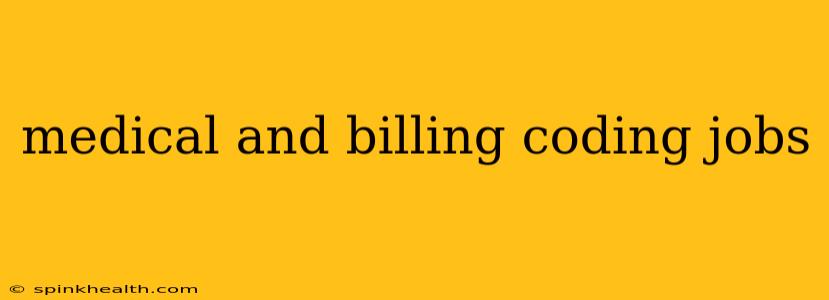The world of healthcare is vast and complex, but behind the scenes, a critical function ensures smooth operations: medical and billing coding. These jobs are vital to the financial health of healthcare organizations, and for individuals seeking a rewarding career with strong job prospects, they present an exciting opportunity. But what exactly are medical and billing coding jobs, and what's involved? Let's unravel the mystery.
My name is Sarah Chen, and for the past 15 years, I’ve worked in various roles within the healthcare billing and coding sector, from entry-level coder to senior compliance manager. I've seen firsthand the evolution of this field and the increasing demand for skilled professionals. This experience informs my insights into this exciting and crucial career path.
What is Medical Coding?
Imagine being the translator between doctors and insurance companies. That's essentially the role of a medical coder. They take the detailed notes from a doctor's visit, a hospital stay, or a surgical procedure and translate that medical language into standardized codes using systems like the International Classification of Diseases (ICD) and Current Procedural Terminology (CPT). These codes are then used for billing, statistical analysis, and tracking healthcare trends. It’s a meticulous job that requires accuracy and attention to detail, as even a small coding error can have significant financial consequences.
Think of it like this: a doctor describes a patient's complex medical history and treatment. The coder then meticulously converts this into a series of numerical and alphanumeric codes, like translating a novel into a different language but with far greater precision. Each code represents a specific diagnosis, procedure, or service.
What are the different types of medical coding jobs?
Medical coding isn't a one-size-fits-all profession. While some coders focus exclusively on inpatient services (hospital stays), others specialize in outpatient coding (doctor's office visits), surgical coding, or even specific medical specialties like cardiology or oncology. The specialization often depends on individual preferences and the employer’s needs.
What is Healthcare Billing?
Medical billing professionals take the coded information and create and submit claims to insurance companies. They ensure the accurate and timely payment for services rendered. This involves understanding complex insurance rules, regulations, and payer-specific requirements. It's about navigating the labyrinthine world of insurance policies and ensuring that healthcare providers receive the reimbursement they are due.
The billing specialist is the financial advocate for the healthcare provider, ensuring accurate and timely claims processing. They act as a liaison between the provider, the patient, and the insurance company, resolving any discrepancies and ensuring payment is received.
What are the key skills needed for medical and billing coding jobs?
Both medical coding and billing require a unique blend of skills. Here are some key attributes:
- Strong analytical skills: The ability to decipher complex medical records and accurately translate them into codes.
- Attention to detail: Even a small error can have significant consequences.
- Knowledge of medical terminology and anatomy: A solid understanding of medical terms is essential.
- Knowledge of ICD and CPT coding systems: Mastery of these coding systems is crucial.
- Computer skills: Proficiency in billing and coding software is vital.
- Understanding of insurance regulations: For billing, knowledge of insurance policies and payer requirements is essential.
- Communication skills: The ability to communicate effectively with physicians, patients, and insurance companies.
- Problem-solving skills: Troubleshooting issues with claims and resolving discrepancies is a regular part of the job.
How much do medical and billing coding jobs pay?
The salary range for medical and billing coding jobs varies based on experience, location, and employer. However, these roles typically offer a competitive compensation package and the potential for growth within the healthcare industry.
What education and training are required for these jobs?
Many medical coders and billers obtain a certificate or associate's degree in medical coding and billing. Some choose to pursue a bachelor's degree for better career advancement opportunities. Several certifications, like Certified Professional Coder (CPC), can enhance employability and earning potential.
Are medical and billing coding jobs in demand?
Yes, the demand for skilled medical coders and billers is consistently high and is expected to grow in the coming years. The aging population and the increasing complexity of healthcare systems contribute to this high demand. The Bureau of Labor Statistics projects substantial growth in healthcare occupations, making these jobs very secure.
What is the career path progression like in medical and billing coding?
Entry-level positions often lead to opportunities for specialization, supervision, management, or even compliance roles, depending on individual aspirations and skills development. With experience, there are ample chances for advancement and higher earning potential.
This comprehensive overview of medical and billing coding jobs should give you a clearer picture of what's involved in these rewarding and secure career options. If you have a keen eye for detail, a fascination with the medical field, and a desire for a career that makes a real difference, medical coding and billing might just be the perfect path for you.

